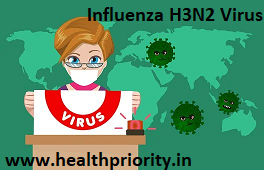H3N2 virus is a type of influenza virus that infects humans and animals, particularly birds. The virus spreads rapidly and can cause severe respiratory illness, including pneumonia and bronchitis. The symptoms of H3N2 virus infection include high fever, cough, sore throat, headache, body aches, and fatigue. It is crucial to treat the virus promptly to reduce the risk of complications and prevent its spread to others. In this blog, we will discuss the various treatments available for H3N2 virus infection.
 |
| Treatment And Prevention Of Influenza (H3N2) Virus: Flu |
Antiviral drugs
Antiviral drugs are the most effective treatments for H3N2 virus infection if given within 48 hours of the onset of symptoms. Two drugs, oseltamivir (Tamiflu) and zanamivir (Relenza), are commonly used to treat H3N2 virus infections. These drugs work by blocking the activity of an enzyme that the virus needs to replicate. They can reduce the duration and severity of symptoms and prevent complications such as pneumonia.
Oseltamivir is an oral medication that is usually taken twice a day for five days. It is generally safe and well-tolerated but can cause mild side effects such as nausea, vomiting, and diarrhea. Zanamivir is an inhalation powder that is administered using a special device called a Diskhaler. It is also given twice a day for five days and can cause side effects such as coughing, wheezing, and difficulty breathing in some people.
It is important to note that antiviral drugs should only be used under the supervision of a healthcare professional. They are not suitable for everyone, particularly those with a history of allergic reactions to these medications or those with certain underlying medical conditions such as chronic obstructive pulmonary disease (COPD) or asthma.
 |
| Treatment And Prevention Of Influenza (H3N2) Virus: Flu |
Symptomatic treatments
Symptomatic treatments are used to alleviate the symptoms of H3N2 virus infection and improve the patient's comfort. These treatments may include over-the-counter pain relievers such as acetaminophen or ibuprofen to reduce fever and ease body aches. Patients may also use cough suppressants or expectorants to relieve cough and loosen phlegm. Rest, hydration, and a nutritious diet may also help the body fight off the infection.
Hospitalization
In severe cases of H3N2 virus infection, hospitalization may be necessary. This is particularly true for patients with a weakened immune system, young children, and older adults. Hospitalization may be required if the patient has developed complications such as pneumonia, dehydration, or sepsis.
In the hospital, patients may receive oxygen therapy, intravenous fluids, and antibiotics if needed. They may also be monitored closely for signs of worsening symptoms, and their condition may be managed with other supportive therapies.
 |
| Treatment And Prevention Of Influenza (H3N2) Virus: Flu |
Prevention
Prevention is always better than treatment, and there are several ways to prevent H3N2 virus infection. The most effective way is to get a flu vaccine each year. The vaccine contains the strains of the flu virus that experts believe will be most prevalent in the coming season.
Other preventative measures include:
- Washing hands frequently with soap and water
- Covering coughs and sneezes with a tissue or elbow
- Avoiding close contact with sick people
- Staying home when sick
- Disinfecting frequently touched surfaces such as doorknobs, keyboards, and phones.
 |
| Treatment And Prevention Of Influenza (H3N2) Virus: Flu |
H3N2 virus infection is a potentially severe respiratory illness that requires prompt treatment to prevent complications and reduce the risk of spreading the virus to others. Antiviral drugs, symptomatic treatments, and hospitalization may all be necessary depending on the severity of the infection. Preventative measures such as vaccination, handwashing, and avoiding close contact with sick people are also essential in preventing the spread of the virus. If you suspect that you or a loved one may have H3N2 virus infection, contact a healthcare professional immediately.

ConversionConversion EmoticonEmoticon